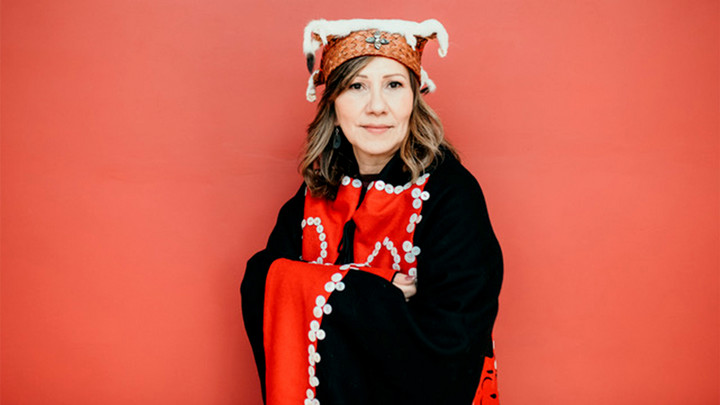Marcia Turner

- Category: Indigenous Community Alumni Award
- UVic degrees: Certificate in Administration in Aboriginal Governance, 1996; Diploma in Public Sector Management, 2005; Bachelor of Arts, 2012
- Current hometown: Snuneymuxw territory, Nanaimo, BC
- Birthplace: Gitxsan territory, Hazelton, BC
About Marcia
Marcia Turner is the founder and CEO of Daxgedim Haanak' Consulting, specializing in systems change, decolonization and dedicated to advancing the rights of Indigenous Peoples. A proud Gitxsan woman, she is a member of the Wolf Clan and Wilp Haijimsxw and carries the leadership name and responsibility Tsu'malit. Her work is deeply rooted in ancestral values, with a commitment to sustainable change for future generations.
With over 30 years of leadership experience, Marcia collaborates with governments, post-secondary institutions, non-profits and Indigenous communities across Canada to advance equity for Indigenous Peoples and Indigenous knowledge systems. She has taught governance and leadership courses at Royal Roads University, the University of British Columbia and the University of Victoria, and previously served as Associate Vice President Indigenous at Vancouver Island University.
Marcia has been invited by the BC government to create a Provincial Indigenous Strategy for Domestic Violence, organize a Provincial Gathering for the families of Murdered and Missing Indigenous Women and Girls and develop a Reconciliation Framework for the Ministry of Health. Marcia developed the Diploma in Indigenous Community Development and Governance for the University of Victoria. Her proudest role is being a mom of four grown sons, an Aunty, sister and grandma to a new grandson.
Recognized as Indigenous Business of the Year (2023) by the BC Achievement Foundation and a TEDxRRU speaker (2024), Marcia is a sought-after advisor, speaker and thought leader committed to dismantling systemic racism, amplifying Indigenous voices and upholding Indigenous rights. She lives in the unceded territory of the Snuneymuxw Peoples.
Life-changing experience
“I never imagined going to university. I was a young 28-year-old mom of four boys and didn't believe I was capable of doing university course work—I had poor grades in high school. Completing the Administration of Aboriginal Governments certificate program changed the trajectory of my career path and gave me the confidence to pursue my bachelor and graduate degrees.”
Career path
“My journey has been incredibly powerful—transforming from a young mom with little education to becoming a leader in decolonization and Indigenous resurgence. My mom went to the residential school, and she never spoke about it. I’m the youngest of eight children, and we didn’t know about the Indian Residential Schools. I am following in the strength and footsteps of my ancestors and those who have walked before me. My work honours my mother’s experience and uplifts generations to come.”
Unlearning self-criticism
“Overcoming those deeply ingrained narratives and unlearning self-criticism took healing, growing and unlearning. Breaking free from limiting beliefs that come from growing up in family violence, addictions and racism, you learn to believe that you are not good enough. Unlearning self-criticism was key to my success and I did this through reconnecting and reclaiming my identity, culture and my rightful place as a Gitxsan woman.”
Sustainable solutions
“A lot of my work is action oriented, solutions-focused and focused on sustainable processes. Sustainability is deeply rooted in long-term thinking and action-oriented change, which aligns with Indigenous values of considering future generations in every decision. The focus on sustainable processes ensures that the work of decolonization and Indigenization does not stop with individuals but becomes embedded in systems and structures. Sustaining change requires a shift in mindset—moving beyond short-term initiatives to long-lasting transformation. My approach, which emphasizes asking ‘How do we sustain this now?’ ensures that organizations and institutions develop the capacity to uphold these changes even after leadership transitions. This perspective reinforces the need for continuous learning, commitment and structural integration of Indigenous ways of knowing and being.”
Change does happen
“I’ve often said that change doesn’t happen when we are comfortable, and as Indigenous Peoples we know that change doesn’t happen at the pace we want it to but change does happen. I was invited by the BC government to develop the provincial strategy for domestic violence… We were facilitating world cafe sessions, when a fellow spoke up angrily and said, ‘This is a waste of time. We've been echoing this for more than 10 years now. Why are we sitting in this room doing this work when we've said this to you for such a long time?’… I told him I completely understand your frustration… As Indigenous peoples we have been echoing for decades the changes we need to see… Fifty years ago, Indigenous peoples weren't allowed in the same room as white people, I said. So here I am in this room with you, and not only am I an Indigenous person in this room with you, I am an Indigenous woman facilitating this meeting. So, change does happen, and every time we gather, change happens.”
Speed round...
A mantra that I follow: I am blessed, I am loved, I'm worthy. Focus on my goals, focus on my dreams, focus on me.
How I relax: I walk with my two pups. They’re big dogs, too. Decompressing, de-stressing and relaxing requires me to get outside and connect with the land.
One food I can’t resist: Cookies. I’ve had to be gluten-free this past four years—I'm Celiac—so there's a coffee shop in Fernwood that makes the best gluten-free cookies.
A live performance I attended recently: Elton John in Vancouver. He was amazing… He engaged the crowd. He told stories. It was one of the best concerts I've been to in a long time.
Something great thing I’ve read: I am reading The Seven Circles: Indigenous Teachings for Living Well. I love it because it’s essentially decolonizing fitness… It reframes fitness to wellness and has me thinking differently about what I do in terms of movement.
About the UVic Alumni Awards
Learn more about how to nominate an alum.
